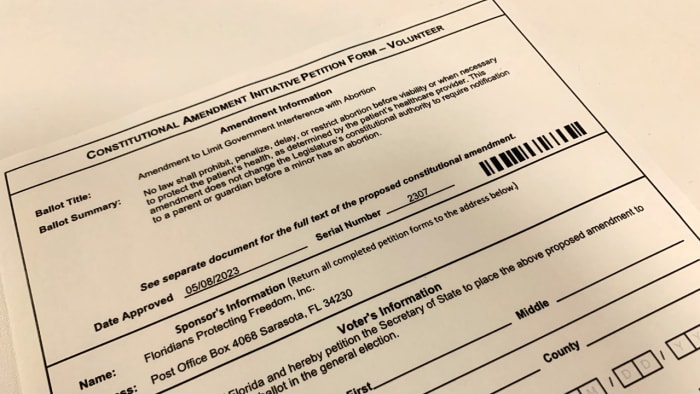
In Tallahassee, Florida, – Following the Florida House’s advancement of its version of the plan, the Senate unveiled a comprehensive bill on Friday that aims to impose new limitations on the state’s ballot initiative procedure.
Scheduled for consideration by the Senate Ethics and Elections Committee on Monday, the bill proposes several changes, including enhanced requirements for petition collection and the potential for legal challenges following the approval of constitutional amendments.
[RELATED: These are the bills Central Florida state representatives are pushing during the legislative session]
Governor Ron DeSantis has actively pushed for modifications to the initiative process, especially after effectively leading the opposition against proposed constitutional amendments concerning abortion rights and recreational marijuana last year. DeSantis and other members of the Republican Party argue that revisions are necessary to address potential fraud in the system, particularly in the gathering of petition signatures necessary to place initiatives on the ballot.
“Amending Florida’s Constitution is a responsibility every voter takes very seriously, and petition integrity is critical to ensuring the effectiveness of the citizen initiative process,” Senate President Ben Albritton, R-Wauchula, said in a statement Friday as the Senate released its bill (SPB 7016). “This legislation increases transparency and accountability for sponsors of initiatives; deters, prevents, and penalizes fraudulent activities; and, provides voters with objective information about financial impacts of proposed amendments at the front end of the process.”
But efforts to restrict the process are drawing criticism from Democrats and other opponents, who say voters need to be able to pass ballot initiatives when the Legislature ignores their wishes. They point to a series of initiatives that have passed on issues such as raising the minimum wage, allowing medical marijuana, starting the state’s voluntary pre-kindergarten program and seeking to prevent political gerrymandering.
[RELATED: These are the bills Central Florida state senators are pushing during the legislative session]
Opponents on Thursday jammed a committee room as the House Government Operations Subcommittee gave an initial approval to the House version (HB 1205).
“Let’s be clear, this bill is not about election integrity,” Genesis Robinson, executive director for the voting-rights group Equal Ground Education Fund and Action Fund, told the House panel. “It’s about fear, fear of the people using their constitutional right to act when you fail to deliver on the issues that matter most to them. House Bill 1205 would make the citizen-initiative process nearly impossible.”
The Senate and House bills share some proposed changes. As examples, they would require that signed petition forms include voters’ driver’s license or Florida identification card numbers or the last four digits of their Social Security numbers; reduce from 30 days to 10 days the deadline for initiative sponsors to submit petitions to elections supervisors for verification; and increase fines for petitions that are submitted late.
[RELATED: How to find, contact your Florida state senators or representatives]
But the 49-page Senate bill, which will be headed by Ethics and Elections Chairman Don Gaetz, R-Niceville, and Sen. Erin Grall, R-Vero Beach, would go further than the House proposal in some ways.
For instance, it would require volunteer petition gatherers — not just paid circulators, as is the case now — to register with the state.
Also, it would tweak a law to make clear that voters could go to circuit court to challenge the approval of constitutional amendments. A Senate overview of the bill said the current law does not “specifically contemplate” such challenges.
“The bill clarifies grounds for contesting the results of a constitutional amendment should be the same as contesting the results of a candidate election,” the overview said. “As such, the bill specifically includes grounds for contesting the results for a constitutional amendment at the state level, including ineligibility of the proposed constitutional amendment for placement on the ballot.”
Also, for instance, the Senate bill would make changes related to what are known as “financial impact” statements that appear on the ballot with proposed constitutional amendments. Financial impact statements, which are issued by a panel known as the Financial Impact Estimating Conference, provide estimated effects of proposed constitutional amendments on government revenues and the state budget.
Under current law, the secretary of state sends initiatives to the Financial Impact Estimating Conference for analysis when the initiatives’ sponsors have collected 25 percent of the required number of signatures to get on the ballot. But under the Senate bill, a financial-impact statement would have to be approved before voters could start signing petitions — a requirement that could delay the start of petition gathering.
The Senate overview said the change would “provide voters considering signing a petition an idea of the impact of the amendment before signing.”
Petition gathering and submission is a time-consuming and expensive process. To place initiatives on the 2024 ballot, sponsors needed to submit 891,523 petition signatures statewide and also meet signature requirements in congressional districts.
State Republican leaders, with support from groups such as the Florida Chamber of Commerce, have taken a series of steps during the past two decades aimed at making it harder to place initiatives on the ballot and pass them. But the issue was refueled last year amid the fights about proposals that would have enshrined abortion rights in the state Constitution and allowed recreational use of marijuana.
The abortion initiative in November received support from 57.2% of voters, while the recreational marijuana measure received support from 55.9%. They fell short of the 60% approval needed to pass constitutional amendments.

















